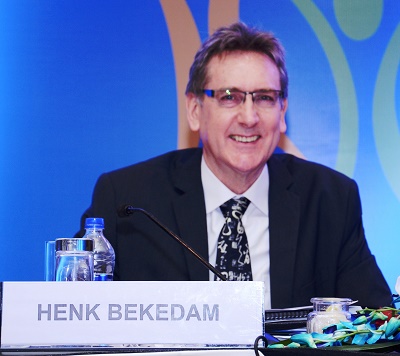On the occasion of the second Universal Health Coverage (UHC) Day, the Ministry of Health & Family Welfare (MoHFW) with technical support from the World Health Organization (WHO) Country Office for India and the World Bank organized an advocacy event to bring key stakeholders together and discuss the approaches and strategies for accelerating UHC in India.
Celebrated on 12 December, the Universal Health Coverage (UHC) Day commemorates the unanimous United Nations resolution in 2012 calling for countries to increase access to quality health care services at affordable cost to every person, everywhere.
Speaking at the inaugural session, Mr B. P. Sharma, Secretary, Ministry of Health & Family Welfare, Government of India reiterated the government’s commitment to advancing Universal Health Coverage in India.
"Increasing the public health spending to 2% of the GDP over the next four to five years will certainly make the health sector more responsive," he added.

Dr Henk Bekedam, WHO Representative to India shared the lessons from other countries, which have embarked on the path of UHC. He highlighted the key components that have enabled countries progress on this important journey: Ensure that there is political commitment to invest in health and UHC; explain the economic benefits of UHC to get ownership of the stakeholders; be guided by human rights and opportunities to reduce inequities; involve the community and civil society, it is important get their buy-in; accept that UHC is a direction and goal and every country can make progress on its journey; define the vision (where to go) and move forward incrementally, step-by-step; listen to the heart when embracing UHC, you do not need to be rich to get started; ensure proper investment in UHC, which includes public health (preventive, promotive, palliative, rehabilitative); have in place and strengthen health services, especially in rural areas (primary care) so that they cover all (compulsory) and create a safety net for the poor through exemption and subsidy; set up a performance framework and monitor regularly UHC, be guided by and generate evidence and adjust regularly.
“We need to have a clear vision where India wants to be in 15 years and develop a roadmap, including a step-by-step process to get there. This will require an agreed upon process in consultation with all stakeholders with a key role for the state governments,” he added.
Deliberating on advancing the UHC agenda in India, the forum dwelt at length on how to make the health system more responsive, equitable and accessible. Other key issues discussed were: international experience and learnings in the area of UHC, policy steps that need to be taken to advance UHC in India, and health financing and service provision scenario in the country. In addition, the panelists reflected on key issues of learnings from implementation experience of Millennium Development Goals (MDGs) for Sustainable Development Goal 3, and the need for health systems strengthening for UHC.
Experts called for a bold and innovative approach to accelerating UHC in India.
The panelists called for a greater debate for developing a national framework on UHC. It was highlighted that the experiences of the states in implementing UHC should feed into such a framework and they could also chart out their own path based on their specific context.
Over 80 technical experts, both national and international, attended the forum. Senior representatives of the MoHFW, the World Bank and development organizations, academic and research institutions, and key WHO officials were a part of the deliberations.
